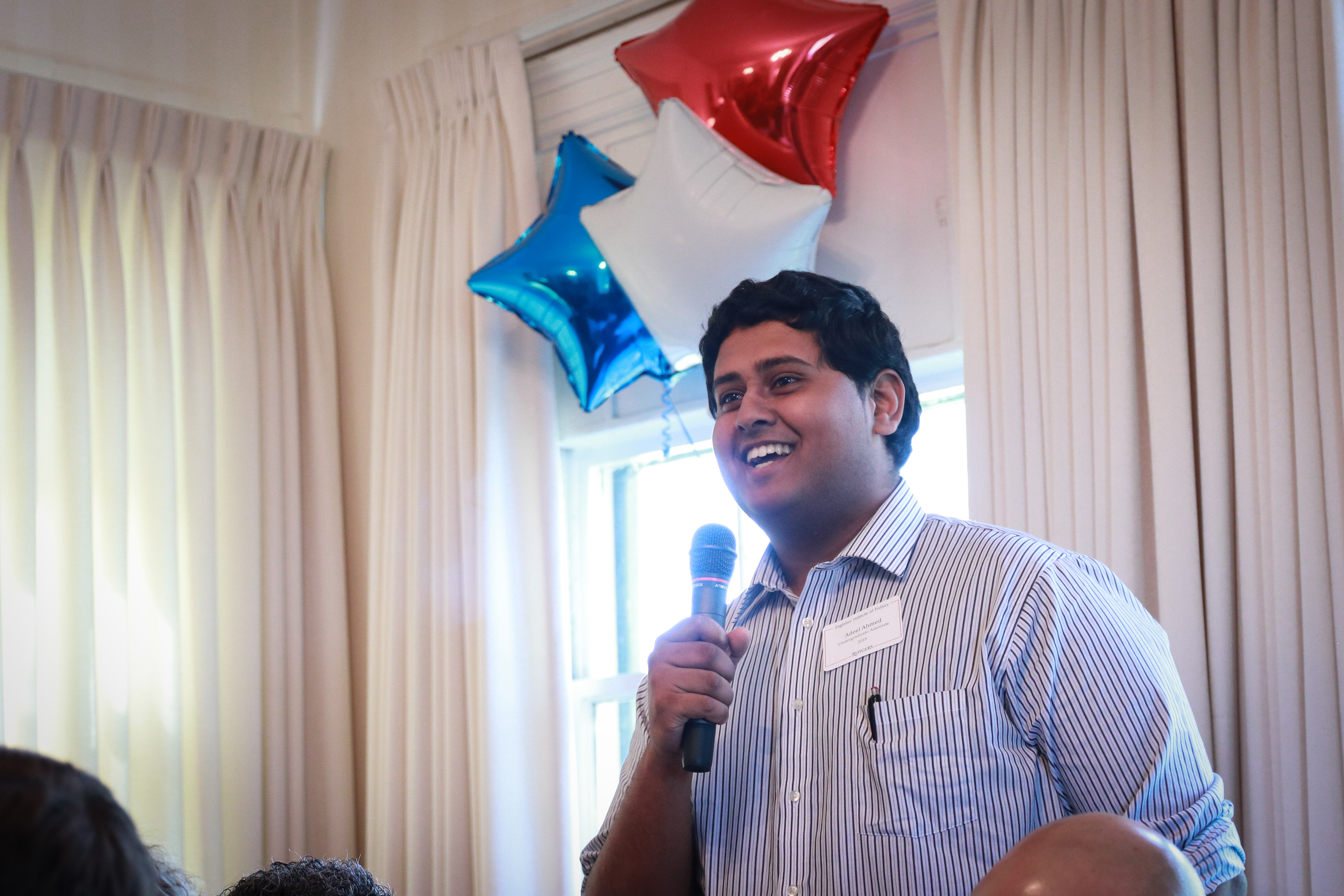About the Undergraduate Associates Program
Building knowledge, skills, and networks for political, government, and community engagement
Applications for the 2025-2026 cohort closed on Monday, October 21st at 5:00 PM for consideration.
If you have questions, please contact Sarah Kozak at undergrad@eagleton.rutgers.edu.
The Eagleton Undergraduate Associates Program is an interdisciplinary certificate program for all Rutgers juniors interested in American politics and government. Associates spend parts of their last three semesters linking the study of politics to its real-world application, building knowledge, skills, and networks for political, government, and community engagement.
Eagleton Undergraduate Associates earn nine credits through a series of three unique courses (one each semester). They participate in program sessions, and an experiential trip to the State House in addition to, completing a public service internship in American Politics, government, policy, or advocacy. They learn about political power and decision-making while honing their leadership and professional skills.

“A few years ago, I didn’t know that a hijab wearing woman could be in the political field. I had no role model to follow. I felt invisible and unheard. So having a group of individuals ready to listen, but also encouraging me to speak, is something that I never experienced before and will value forever.”
Yasmine Hafez, UA Alum

“The best thing about Eagleton was being able to be freely interested in politics and be intellectually challenged by your peers in a friendly way. The discussion and variety of perspectives, it is so rare to be around people you have a like interest with low stakes.”
Oluwatobi Omotoso,UA Alum
 “Learning how to navigate the ambiguity of politics has been incredibly eye-opening. Government is not as dichotomized as I previously thought. There are policies and decisions that I would agree with on both sides of the aisle. More than anything, the Undergraduate Associates program has taught me my role in American politics. After experimenting with and learning about many different industries involving politics, I have finally discovered what I am most interested in: constitutional rights, media, and civic engagement.”
“Learning how to navigate the ambiguity of politics has been incredibly eye-opening. Government is not as dichotomized as I previously thought. There are policies and decisions that I would agree with on both sides of the aisle. More than anything, the Undergraduate Associates program has taught me my role in American politics. After experimenting with and learning about many different industries involving politics, I have finally discovered what I am most interested in: constitutional rights, media, and civic engagement.”
Caleb Kuberiet, UA Alum
Eagleton Undergraduate Associate Program Learning Objectives
Through a three-course series, public service internship, and experiential education sessions, students in the program will:
- Understand power dynamics, decision making processes, policies, and structure of American political and government systems.
- Demonstrate knowledge of how to positively impact government, politics and communities to improve American democracy.
- Cultivate positive behaviors and attitudes towards democratic values and good governance.
- Develop core personal, professional and advocacy skills necessary to be engaged citizens, and adaptable public service leaders who address pressing social needs.
- Explore the role diversity in identity, beliefs, and political perspectives play in democratic discourse.
Course Series
Spring Junior Year
Practice of Politics
Course #: (790:428:01)
Day/Time: Wednesdays 10:20 am‐1:20 pm
Location: Wood Lawn Mansion, Douglass Campus
Professor: Saladin Ambar
This course examines the role of power in the practice of politics, with a primary focus on American institutions and political behavior. What is power? How does it work in our political system – and what makes it an at once critical, but also troubling aspect of governance within a democratic system? These questions will be explored with an emphasis on theories of power and its function throughout American history. Our approach will incorporate critical works in American politics and political science – while culling visions of power from the literary and artistic world that inform the practical sphere of government in unique ways. It is the human experience of power, after all, that matters most – and for that insight, we will seek out the assistance of William Shakespeare, Sylvia Plath, Ralph Ellison, James Baldwin – and others – looking for guidance and answers less discernable through the lens of the social sciences alone.
Fall Senior Year
Internship Seminar
Course #: (01:790:481:02)
Day/Time: Mondays 5:40‐8:40 pm
Location: Wood Lawn Mansion, Douglass Campus
Professor: Francine Newsome Pfeiffer
This seminar is designed to complement Undergraduate Associate internship field placements in government and politics with readings, discussions, guest speakers, and papers to foster a deeper understanding of both the institutions and the individuals that shape public policymaking. In addition to learning about a variety of careers in the political realm, the class will examine organizational dynamics and the elements of leadership which impact the workplace. As a group seminar, students will be expected to participate actively in class discussions, offering perspectives drawn from current or previous internships/work experiences, readings, and guest speakers to shed light on the knowledge and skills needed to succeed, and lead, in a variety of positions and institutions. Students will also have many opportunities to hone their strategic thinking, communications, and professional networking skills during the course.
Spring Senior Year
Process of Politics
Course #: (790:429:01)
Day/Time: Tuesdays 10:20 am‐1:20 pm
Location: Wood Lawn Mansion, Douglass Campus
Professor: Ginger Gold Schnitzer
This final course of the Undergraduate Associates program, “Processes of Politics,” is designed to help students deepen and apply their understanding of politics and governance by providing windows into how “the system” works and how decisions are made. Building upon the exploration of political power from previous semesters, this course centers around the notion of “politics as a choice”. Politics is a world of limits and alternatives. Everyone in the world of politics – from voters to presidents – faces difficult choices. As such, much of our time will be spent considering political decision-making and the political actors and institutions producing political decisions. Each week, students will analyze political decision-making and will give special consideration to the ramifications of the processes and ultimate decisions on democratic ideals – how and when do processes and decisions uphold the ideals of American democracy and when do they fall short?
Juniors from all Rutgers schools and departments at all campus locations with a minimum 3.0 cumulative GPA are welcome to apply.
Political Science majors/minors please note:
- Either spring Eagleton course (790:428 or 790:429) can count for the required Political Science Seminar course (790:395). The fall internship seminar and placement hours cannot be a substitute for the 395 seminar requirement.
- The fall Eagleton Internship Seminar class can towards political science major/minor credit, except as noted below:
- If a student has already taken two 790 internships in political science, independent study OR research courses, then the Eagleton internship course cannot count towards the major or minor.
- Political Science minors should NOT take a 395 seminar in political sciences, even if the instructor gives them a special permission number, because it will not count toward the Political Science minor.

“I enjoyed the opportunity of working with other students interested in politics and government along with interesting and enthusiastic professors and staff.”
How to Apply
Application packets include:
- Completed application form (attach resume, essay, and unofficial transcript attached)
- Two letters of recommendation (emailed directly to undergrad@eagleton.rutgers.edu from the recommender). Eagleton must receive ALL components of your application packet (including letters of recommendation) is closed. Recommendation letter deadline closed on Monday, October 21st at 5:00 pm. Incomplete packets will be sent to the selection committee “as is”.
Please review the instructions and fields in the application form before you start the application process.
Applying to the Eagleton Undergraduate Associates Program is a three-step process:
1. Attach application packet documents to application form resume, essay and unofficial transcript (.doc or .pdf only)
2. Complete all fields on the application form. Click submit application at end.
3. Academic letters of recommendation are emailed from the recommender directly to undergrad@eagleton.rutgers.edu before the deadline. Letters of recommendation can not be confirmed until students submit their application, so please submit your application well in advance of the deadline.
When you submit your application, please note you will NOT receive a confirmation email. After submitting, you will see a confirmation screen. You will also receive an email from undergrad@eagleton.rutgers.edu when your application is processed and with recommendation letter status.
Eagleton must receive ALL components of your application packet by Monday, October 21st at 5:00 pm. Late applications will not be accepted. Receipt of recommendation letters will be confirmed with applicants via email after their application is submitted. All recommendation letters must be received by Monday, October 21st at 5:00 pm to be included in this application packet.
APPLY NOW.
Frequently Asked Questions
Why should I apply?
- Engage in small seminars with diverse political and policy concepts, speakers, and classmates.
- Develop leadership and professional skills to promote political and community change.
- Earn 9 credits.
- Gain experience through broad public service internship opportunities.
- Learn from guest speakers and faculty with real-world expertise in politics, government, and advocacy.
- Expand your network through events and connections with more than 2,100 alumni and other political practitioners.
- Job placement and career counseling assistance are available.
How to apply
Eagleton must receive ALL components of your application packet by Monday, October 21st at 5:00 pm. Late applications will not be accepted. Receipt of recommendation letters will be confirmed with applicants via email after their application is submitted. All recommendation letters must be received by Monday, October 21st at 5:00 pm to be included in this application packet.
FAQ
Who is eligible to apply?
Rutgers juniors with a cumulative GPA of 3.0 or higher with 60-89 credits from all campus locations, schools, and majors are eligible to apply. Eligible applicants must be graduating in May or December 2026. Transfer and international students are eligible to apply.
Is there a minimum GPA?
There is no strict minimum overall GPA to apply, but most students who are selected have a cumulative GPA of 3.0 or higher. Students with grade concerns are welcome to upload a narrative explanation in secondary or additional transcript field on the application.
What are the requirements of the program?
Requirements for Eagleton Undergraduate Associate program students are listed below. Missing requirements in any semester or failing to maintain minimum academic standards can lead to revocation of your acceptance into the program. Students who complete the program will receive a certificate and official notation on their Rutgers transcript.
FALL SEMESTER (JUNIOR YEAR)
- Welcome Session (December reading day, 12 noon – 2:00 pm at Eagleton)
SPRING SEMESTER (JUNIOR YEAR)
- Course 1: Practice of Politics (790:428, 3-credits) meets every Wednesday 10:20 am-1:20 pm at Eagleton
- Internship placement meeting (individual meeting with Director, February-March)
- Spring Program Session I (one morning/afternoon at Eagleton)
- Attend at least one Eagleton public/student program, help amplify Institute events and student opportunities
- Involvement in Eagleton Political Journal (submit article, staff, and/or help amplify)
FALL SEMESTER (SENIOR YEAR)
- Course 2: Internship in Political Science (790:481, 3 credits) meets 8 to 9 Mondays 5:40–8:40 pm at Eagleton.
- Internship in American politics, government, policy or advocacy office or organization (120 hours).
- Fall Session: State House Trip ( one day at State House, Trenton)
- Career/Connect meeting (individual meeting with Director, October-November)
- Help recruit the next cohort of Undergraduate Associates (September-October)
- Attend fall career panel (date and mode TBD)
- Attend at least one Eagleton public/student program, help amplify Institute events and student opportunities.
SPRING SEMESTER (SENIOR YEAR)
- Course 3: Processes of Politics (790:429, 3-credits) meets every Tuesday 10:20 am-1:20 pm at Eagleton
- Career/Connect meeting (individual meeting with Director, March-April)
- Spring Program Session II (one morning or afternoon at Eagleton)
- Spring networking event or career panel (date TBD)
- Campaign training (dates TBD)
- Attend at least one Eagleton public/student program and help promote Institute events, news, opportunities
- Program Graduation (early May, 6:00-9:00 pm at Eagleton)
Grades and Academic Standards:
Associates must maintain a minimum 3.0 cumulative GPA throughout the 3-semester program. Associates must also receive a B grade or better in each of the required program courses before they can move on to the next course in the series. Grades and assignment deadlines are determined by each course professor/instructor, all coursework must be completed within the semester, and a grade of B or better assigned at least one week in advance of the following semester start date. These requirements are strictly enforced.
Do Eagleton classes count toward my major?
Program courses are 3 credits each, listed in the Rutgers-New Brunswick School of Arts and Sciences, Department of Political Science. Students should check with their academic school or department advisor as to how Eagleton course credit will count towards their major/minor requirements. Political science majors and minors from the School of Arts and Sciences can apply courses towards degree as follows:
- Either the Practice of Politics and/or Processes of Politics can count for the required Political Science Seminar course (790:395).
- The fall internship seminar or placement hours CAN NOT substitute for the 395 seminar requirement.
- The Eagleton Internship Seminar will count toward major/minor credit except if:
- The student has already taken two (2) 790 internships in political science, independent study, OR research courses, then the Eagleton internship course will NOT count towards the major or minor.
- Political Science MINORS should NOT take a 395 seminar in political sciences even if the instructor gives them a special permission number because it will not count toward the Political Science minor.
If you have any questions regarding the requirements for your political science major/minor please contact Christine Cahill in the Department of Political Science at cahill@rutgers.edu.
Can I do study abroad and still be an Undergraduate Associate?
Associates must be on campus for the spring semester of junior year, and fall and spring semesters of senior year to be eligible. All Eagleton classes must be taken in sequence and in person. Study abroad CAN be done during the fall of junior year or the summer before senior year.
What internship options are available? Are there research awards available?
Students complete a minimum of 120 hours in a public service internship. All internship hours must be completed by the end of November. The Eagleton Institute of Politics focuses on engagement in American politics and government, so the required internship should enhance a student’s understanding of and experience in these areas. Students may intern with a wide range of government agencies or elected officials, nonprofits, interest groups, political parties or campaigns, policy and advocacy-related groups. Internships can be in New Jersey or across the country and can be paid or unpaid.
Additional internship options:
- Kathy Crotty Legislative Internship Award Annual award offered to Undergraduate Associates in honor of Kathy Crotty, a leader on the staff of the New Jersey Legislature for 35 years. Recipients are placed in the New Jersey Legislature at the State House and receive $500 to help pay for travel expenses. Contact Sarah Kozak for details.
- Rutgers-Eagleton Washington Internship Award Program. Open to Rutgers University undergraduates on all campuses and class years, recipients receive up to $6,000 towards living expenses while complete an unpaid nonprofit/government sector internship in Washington DC. Learn more here Learn more here.
- Rutgers Scarlet Service-DC. Open to Rutgers sophomores and juniors. Earn a $3,500 stipend and free housing to complete a public service internship at a nonprofit or government office in Washington DC. Also includes a 3 credit in-person course. Learn more here
- Rutgers Scarlet Service Internship (summer only). Open to Rutgers sophomores and juniors. Earn a $5,000 stipend to complete a public service internship at a nonprofit or government office in New Jersey or surrounding area. Also includes a 3 credit online course. Learn more here
Additional research opportunities for Undergraduate Associates include:
- Eagleton-NJPRO Business and Policy Undergraduate Research Award which provides $1,000 award for undergraduate student research focused on how state or federal politics and public policy impact New Jersey’s business community. Contact Sarah Kozak for details.
- John and Ann Holt Endowed Undergraduate Applied Research Fund in American Politics, up to $1,200 financial award available to juniors and seniors to conduct research. Details here.
Do I need to have an official transcript to apply?
No. Upload your UNOFFICIAL transcript(s) to your application as Adobe pdf or MS Word document only. Please include your current fall semester class list. You can submit up to three transcript documents. Transfer students should attach unofficial transcript from previous college and Rutgers fall semester class list.
What should my essay focus on?
In 500 words or less, please describe the following four items in paragraph form:
- your interest in American politics, government, policy and/or advocacy
- previous related experience, or relevant lived experience
- career goals and why you are applying to the program
- what you hope to get out of the program
Descriptions of relevant passions and policy interests are also welcome. Your essay must be attached to your online application as MS Word or Adobe PDF file. Make sure to include your name at the top of the first page.
I submitted my application, now what?
When you submit your application you will see a confirmation screen and you will also receive a confirmation e-mail. You will also receive emails from undergrad@eagleton.rutgers.edu when your application is processed and status of your recommendation letters. All students will be notified of selection committee decisions via email in mid November.
Who should I ask to write my letters of recommendation?
Two academic letters of recommendation must be submitted in support of your application. Letters should be written by those who have taught you in the classroom and can speak to your academic qualifications for the program, preferably in political science or a related discipline. Transfer students can use professors/teaching assistants from previous college. A third supplemental letter may be submitted from internship supervisors or other professional experiences.
Letters must be addressed to the “Undergraduate Associate Selection Committee” and emailed as MS Word document or Adobe pdf directly from the recommender to undergrad@eagleton.rutgers.edu. Letters sent directly by the applicant will not be accepted.
Students should submit application before letters of recommendation are sent. All recommendations must be received by 5:00 pm on the deadline date in order to be considered. Late recommendation letters will not be forwarded to the selection committee.
Applicants will be notified by email when letters of recommendation are processed by Eagleton.
All students will be notified by email of selection committee decisions in late November.
Alumni
“The best aspect of the Associates program was the internship placement. It was great to enter an internship as a representative of the Associates program and … be able to network with other Eagleton alumni in the Governor’s Office.”
–Eagleton Undergraduate Associate Alum
There are currently more than 1,100 alumni of the Eagleton Undergraduate Associates program. Some have chosen careers in law, politics, advocacy, and public affairs, while others have applied their advanced knowledge of government and politics to a broad range of careers in the private and non‐profit sectors.
Current Undergraduate Associates
Class of 2025 Eagleton Undergraduate Associates




 “Learning how to navigate the ambiguity of politics has been incredibly eye-opening. Government is not as dichotomized as I previously thought. There are policies and decisions that I would agree with on both sides of the aisle. More than anything, the Undergraduate Associates program has taught me my role in American politics. After experimenting with and learning about many different industries involving politics, I have finally discovered what I am most interested in: constitutional rights, media, and civic engagement.”
“Learning how to navigate the ambiguity of politics has been incredibly eye-opening. Government is not as dichotomized as I previously thought. There are policies and decisions that I would agree with on both sides of the aisle. More than anything, the Undergraduate Associates program has taught me my role in American politics. After experimenting with and learning about many different industries involving politics, I have finally discovered what I am most interested in: constitutional rights, media, and civic engagement.”